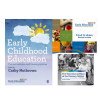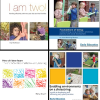Teaching in the early years
by Cathy Gunning Teaching in the early years is not easily definable. Early teaching and learning is about the process, the journey and the unique
by Clarissa Frigerio
Why are there so few men teaching in the early years? I have worked in the profession for almost 9 years, and I was lucky to teach internationally (Italy, USA, and UK). Only once in that time I worked with a man. But this should not have been a surprise, as latest government figures show that only 2-5% of the early years workforce is made up of men (DfE, 2016). The absence of men in the profession is problematic for gender equitable arguments, with gender imbalances in early years making it “women’s work” (Burn and Pratt Adams, 2015) in public discourse. In contrast, a greater presence for men in early years would be a major benefit for representativeness. If more children saw both men and women included in their education and care, gender stereotypes could be tackled from the start, and children to develop a more gender equitable outlook. In this blog I will share some of the reflections and practices that emerged in conversation with five male teachers working in contemporary British early years.
The men I interviewed came from different professional backgrounds, however, they all had previous experiences teaching in primary or secondary school. They were all British, ages between 27-50. They transitioned to early years due to discontent with the prescriptiveness of the National Curriculum. Instead, working in the early years allowed them to explore creative and fun approaches to teaching and learning. One told me:
“you don’t really need to sit down at your desk and follow standard procedures. You have more freedom to create, and you can help children develop confidence, and let them think and reflect”.
Alongside their perceived freedom and creativity, these men appreciated having a real impact on children. They all placed children at the centre of their teaching pedagogy, showing a desire to help them grow and become more independent. They had felt a lack of this aspect when they had taught in primary and secondary. As one of them said,
“in primary, you focus too much on the academic side of teaching, you are focused on targets, and you miss what’s most important, the emotional aspect of working with children”.
Freed by early years to adopt their own pedagogy, concepts of care and love became the main drive in their work, shaping their understanding of childhood and lesson plans. The majority of them stressed that in early years, both teachers and children work together as a family:
“we learn together, we play together, we make friends, and, at times, we also ‘fail’ together, learning from our mistakes”.
From these experiences, one would assume that working in the early years is a blast. Why, then, aren’t more men involved? One of the teachers had a pretty straightforward answer for me: “no boy would ever dream of working in the early years!”. Simply put, none of these men thought that this career was open to men. They all grew up with female teachers in the early years of their lives. One of them, as he enrolled in his teaching qualification, was only given brochures for a BA Primary with QTS. He wanted to work with young children but assumed that there were no courses to teach in early years. In the end, it took him 18 months to switch to a BA in Early Years. Others, struggled to stay in the role due to pressures to get a promotion. According to the government provider survey (2016), female teachers make up 85% of the workforce, but are less represented in leadership roles. Only 70% of the primary headteachers are female, and data shows that females tend to take up their first as middle leaders in primary after 10 years of experience, while men get promoted with only 8 years of experience.
The presence of men in the early years is a huge benefit to both teachers and children. The male teachers I talked with have recognised how their understanding of teaching grew working with young children:
“in the EYFS I understood how children learn, I can almost see how they are developing inside their head, through curiosity and play, and I think most men are missing out on a great learning opportunities”.
Also, these men reflected on how their presence can tackle gender stereotypes within the classroom:
“I can change the perception of what males do or don’t do. You know, sometimes I’m like ‘I’m busy playing with dolls’, and I say it like that. Like it’s normal. And if more people did it, children would accept it as normal”.
This is central to the debate around men in early years. The involvement of men in children’s lives – both at school and at home – should be normalised and welcomed, to support children’s learning and progress. As early years practitioners we all know that a nurturing and safe environment is paramount for children’s learning. This includes how we co-operate with fellow teachers. I argue that raising awareness of male teachers’ work and pedagogical beliefs can only enrich the way we understand early years, and open up valuable discussions about gender perspectives.
Clarissa Frigerio has just completed her PhD at Edge Hill University and works as Programme Delivery Executive at The Scouts Association.
by Cathy Gunning Teaching in the early years is not easily definable. Early teaching and learning is about the process, the journey and the unique

The letter below sets out our key asks for the next government.
On 10 June, Labour announced their plans for “over three thousand new nursery classes across England to open up access to childcare hours for families”,
The Lib Dems have published their manifesto, including commitments to incorporate the UN Convention on the Rights of the Child into UK law and to
Today, Friday 17 May, the Early Education and Childcare Coalition (EECC) has launched its new manifesto, with proposals to rescue and reform England’s early education
A new campaign to boost recruitment to the early years sector in England is being launched today by the government. The government press release says:
by Katherine Gulliver Introduction Early Education was recently asked to review the special educational needs and/or disabilities (SEND) provision in the early years within one
For many of us, the path we’ve taken in our careers can often be traced back to the passions and talents of our childhood and
In a speech today, Kier Starmer will set out Labour’s plans to expand opportunity via five “missions” including “Early years reform – to boost child development with an
The Department for Education (DfE) is currently consulting on proposals to amend the Early Years Foundation Stage. They propose relaxing the requirements around the minimum
by Dr Jo Albin-Clark, Edge Hill University and Dr Nathan Archer, Leeds Beckett University Inspection in the news Being involved in education in England involves
The Department for Education (DfE) have published their response to the consultation on potential changes to staff:child ratios. The consultation received responses from nearly 10,000
by Kayla Halls, Early Years Research Fellow at Middlesex University & Mona Sakr, Senior Lecturer in Early Childhood at Middlesex University’ Leaders in the early
Today, teachers from the National Education Union are striking, including many working in nursery and reception classes. In the last week, the Department for Education
by Amanda Ince and Liz Bullough, UCL Institute of Education “I want to be an inspiring leader who can inspire my colleagues in my setting
Ofsted’s latest annual review highlights the impact of recruitment and retention challenges and finds a link between inspection outcomes and the proportion of graduates in
It could be argued that teachers who move into teaching reception for the first time, face the same challenges as the children themselves as they start in reception.
The tenth early years minister in ten years, Kelly Tolhurst, is now in post. It’s good news that early years is part of a Minister
We deplore the recent article by The Telegraph which singled out Liz Pemberton for criticism of her anti-racism training, which she has delivered for many
External Vacancies Internal Vacancies To advertise here, contact office@early-education.org.uk Organisation and multisite members may advertise vacancies for free as part of the membership package. Download Job advertisement
This article by Early Education Associate Anni McTavish explores the term “cultural capital”, and what it might mean for early years practitioners and their settings.
Introduction Race and racism in society is as important as ever; I am writing not only as a British South Asian who has experienced racism,






Early Education
2 Victoria Square
St Albans
AL1 3TF
T: 01727 884925
E: office@early-education.org.uk